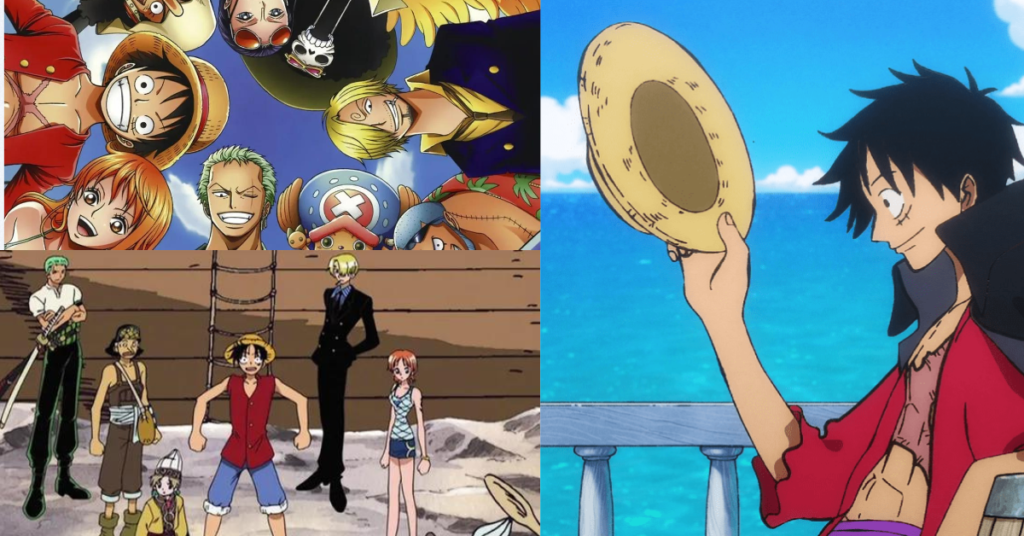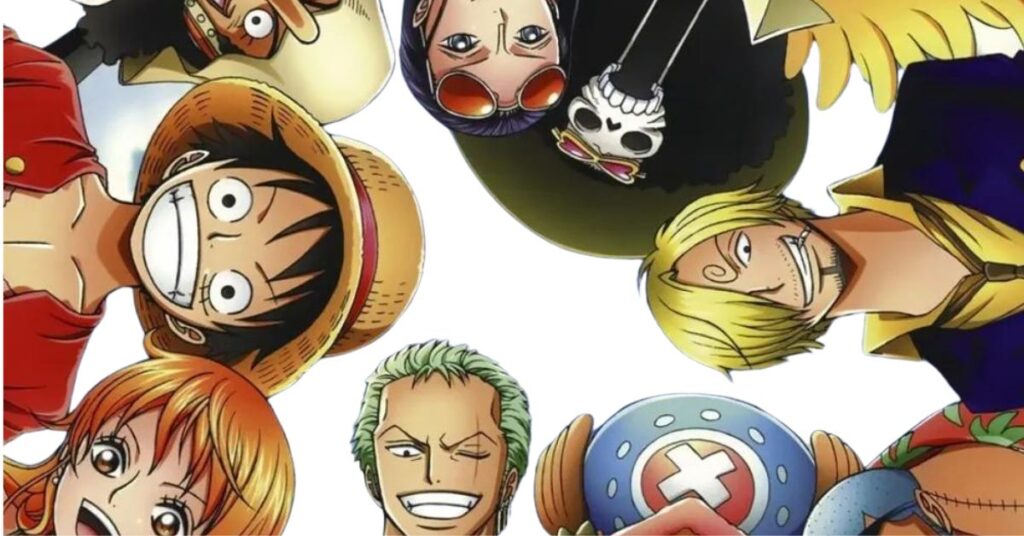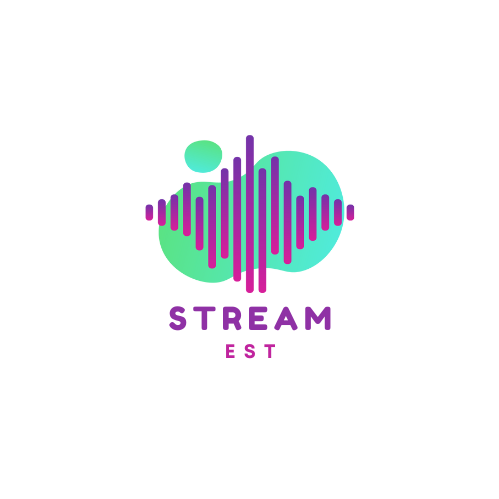Monkey D. Luffy develops rubbery stretchiness upon eating Devil Fruit. He sets off to locate One Piece with his eclectic team, embarking through the ocean on a thrilling journey for the famous treasure, One Piece. This series has been considered an essential watch for people who love anime because of its captivating storyline, charismatic characters, and exciting action scenes, making it a cult anime favorite worldwide.
The intro to all episodes in one part through video clips
One Piece Filler Episodes List
It is worth noting that the One Piece Filler anime features specific episodes that contain only filler content and other arcs that are necessary to go through before watching any movies. One Piece movies. The decision of whether or not to see filler TV shows is left to the viewer. If you’re planning to enjoy watching the One Piece movies, there are certain arcs you should not skip.
For your convenience with your search, we’ve compiled the following table of One Piece filler episodes for you in the following table. This list serves as an easy reference for ease of viewing.
One Piece Filler Arcs
| Episode NO | Episodes |
| 54-60 | Warship Island Arc |
| 98, 99, and 102 | Alabasta Mini-Filler Arc |
| 131-135 | Post-Alabasta Arc |
| 136-138 | Goat Island Arc |
| 139-143 | Ruluka Island Arc |
| 196-206 | G-8 Arc |
| 220-224 | Ocean’s Dream Arc |
| 225-226 | Foxy’s Return Arc |
| 279-283 | Straw Hat’s Backstories Arc |
| 291, 292, 303 | Straw Hat and Buggy’s Adventures Arc |
| 317-319 | Post Enies Lobby Filler Arc |
| 326-336 | Ice Hunter Arc |
| 382-384 | Spa Island Arc |
| 406,407 | Boss Luffy Arc |
| 426-429 | Little East Blue Arc |
| 457,458 | A Special Retrospective Before Marineford Arc |
| 492 | One Piece x Toriko Crossover 1 |
| 499 | Luffy’s Past |
| 506 | Straw Hats Reaction |
| 542 | One Piece x Toriko Crossover 2 |
| 575-578 | Z’s Ambition Arc |
| 590 | One Piece x Dragon Ball x Toriko |
| 626-628 | Caesar Retrieval Arc |
| 747-750 | Silver Mine Arc |
| 775 | Straw Hats Rescue Operation |
| 780-782 | Marine Rookie Arc |
| 895-896 | Cidre Guild Arc |
| 1029-1030 | Uta’s Past |
One Piece Filler Standalone Episodes

| Episode NO | Episodes |
| 50-51 | The Usopp stories and Sanji’s mishaps in Loguetown |
| 93 | Sanji and Chopper go off to find supplies in the harsh desert of Alabasta |
| 98-99 | The Straw Hats run into trouble as they attempt to save Alabasta |
| 102 | The group begins to experience hallucinations while they travel across the desert of Alabasta. |
| 213-216 | An extension of the Davy Back fight in the “Long Ring Long Land” Arc |
| 279-283 | An entire series of episodes centered around the crew which take place in the “Post-Enies Lobby” Arc |
| 291-292 | The beginning to Boss Luffy, a story of the One Piece characters, set in an alternate universe in the 19th century of Japan |
| 303 | Boss Luffy is believed to have stolen the oldest cherry tree right before the village’s festival |
| 317-319 | A special where the adorable hero, Chopperman, must save his favorite radio station from an evil villain |
| 336 | Check in on the disappearing Straw Hats, as well as how they’re faring within their new surroundings. |
| 406-407 | Boss Luffy returns, this time to take part at the Great Portable Shrine Race with his pals |
| 418-420 | The tales of how the other Straw Hats ended up in the aftermath of meeting with Kuma |
| 453-456 | The members of Straw Hats are informed about Ace’s fate. |
| 457-458 | The Retrospective Episodes occur when the Marines get ready for war |
| 492 | Crossover special with characters from Toriko |
| 497-499 | The flashback is an extension of Luffy’s post-Summit War flashback |
| 506 | The members of Straw Hats are informed about the fate of Ace. |
| 542 | Another crossover special with Toriko |
| 590 | A crossover with both Toriko and Dragon Ball Z |
| 737 | The tale of Sabo’s trek into the Revolutionary Army |
| 775 | The Straw Hats try to cure Zunesha after their encounter with Jack as well as the Beast Pirates |
| 907 | An adaptation special to Eiichiro Oda’s first work One Piece, Romance Dawn in celebration of the 20th anniversary of the popular series. |
| 1029-1030 | Movie-linked episodes exploring Luffy and Uta’s childhoods |
The Extent Of Fillers In One Piece

From its inception at the end of 1999, One Piece is now an iconic character in animation, enthralling viewers for nearly two years. Since the series has lasted so long, one can only wonder how much filler material it has compared with other anime that run for a long time. If we look at the other two members of Shonen Jump’s “Big 3”–Naruto and Bleach, One Piece has a distinct advantage due to the relatively small filler episodes.
Bleach was a popular television show with 366 episodes and around 161 filler episodes during its initial season. Naruto and its sequel, Naruto: Shippuden, were shown over 500 episodes combined. Of these, around 200% of them are fillers. Around 41 percent of the Naruto series was filled with filler material.
Contrastingly, One Piece has reduced its filler episodes to an absolute minimum. Its careful planning has enabled the main storyline to develop quickly without significant interruptions. The comparatively small amount of filler material within One Piece not only keeps viewers entertained but also ensures that the plot remains coherent and faithful to the original storyline of the manga. How they do it highlights the creators’ dedication to the show’s integrity and consistency, which sets One Piece apart from other well-known Shonen series.
Must-Watch One Piece Fillers

“G-8” arc “G-8” arc is a stunning example of why One Piece is so beloved. Every member of the Straw Hat crew gets an opportunity to shine and show their talents and personality. The arc is among the most entertaining episodes, with unforgettable scenes like the Condoriano mistake and Luffy’s bizarre hideout for the balloon of an octopus. In addition, the main villain, Vice Admiral Jonathan, is a joy to observe. The sagacity and intelligence of Vice Admiral Jonathan make his efforts to capture the spirited Straw Hats especially enjoyable.
A standout film, one of the desirable fillers is “One Piece Film: Strong World.” This isn’t a more installment in the franchise; it’s among the perfect One Piece films ever produced. The film boasts an exciting plot with a captivating main antagonist and stunning action sequences, all written by Eiichiro Oda himself – its original creator – making this unique. Eiichiro Oda’s involvement ensures top-quality content creation!
Before you begin to watch “Strong World”, it’s essential to check out”Little East Blue” “Little East Blue” arc within Strong World’s main story. This is an excellent intro to the movie and provides memories as the cast returns to elements of their previous lives during East Blue. The seamless transition into the film enhances the experience overall. It’s all about the comedy, character growth, or excitement. The One Piece fillers are worthwhile for anyone who enjoys the anime.
The Content In One Piece’s Filler To Other Shonen Animation

With its remarkable total of more than 1100 episodes, One Piece is a standout within the world of shonen animation because of its low proportion filled with filler material. The show has only 99 episodes classified as filler material; they comprise around 9 percent of the total collection. It is much less than other shows of the same genre, like Naruto and Bleach, which contain filler material comprising approximately 40 percent and 45 percent of their shows and 45%, respectively.
Dragon Ball, another long-running series, features around 13% of the episodes filled with filler. The relatively low percentage of fillers within One Piece makes it one of the less cluttered episodes of major Shonen animation. Rather than its high number of non-canon series, it presents its length as the main obstacle for novice viewers.
However, modern shonen anime are more likely to have more filler than ever, principally because of changes to production methods. Modern series typically take season breaks to allow for a more excellent, focused adaptation of the original material without needing to fill the gaps to keep the same broadcasting schedule. For example, modern-day popular anime such as Jujutsu Kaisen and Demon Slayer: Kimetsu no Yaiba have avoided filler-filled episodes entirely. This makes One Piece’s filler material appear more substantial in the context of other anime. Yet, it’s tiny compared to anime in terms of duration and time.
The newer trend of anime to reduce or remove fillers reflects an overall shift in the field. As studios choose to make seasons-based releases, there’s less pressure to stretch stories in a way. This method maintains the film’s originality and helps keep the story flow consistent and exciting. So, even though One Piece has minimal filler material for the period, it is higher than anything else encountered in contemporary anime. However, the limited filler material is a significant reason for its popularity as an arduous but enjoyable trip for those who love it. It focuses on the rich and vast world Eiichiro Oda has created.
How One Piece Has Minimized Its Use Of Filler Content

One Piece has dramatically reduced the number of filler episodes and arcs, and the method behind the success is transparent. Instead of using a lot of filler episodes in the series, it frequently incorporates original episodes in existing episodes or expands the canonical sequences. This allows Toei Animation to sufficiently expand arcs to ensure there’s never an arc between the manga and manga. This reduces the requirement to fill arcs with filler, which is one of the challenges that series that run for a long time face.
This approach, however, has its flaws. The most frequent critique against One Piece is that the anime has overstuffed scenes. The show is infamous for excessively stretching material by adding original scenes, which only extend the duration or lengthen canonical episodes until they are no longer relevant. This is an alternative to stuttering through the plot in the middle of a long period with filler scenes, but it often makes it difficult.
One Piece has tried to resolve the issues in the last few seasons. While the show continues to pad with episodes, it concentrates on expanding scenes that must be fully developed within the original manga. This method increases the story’s depth and allows animators to showcase some of the best and most innovative animations ever seen in an anime. Although there are more complete solutions to the issues with pacing, it’s a much more efficient method of dealing with filler material. In addition, it has led to some memorable scenes in anime over the last few years.
Through a focus on improving existing episodes and decreasing the inclusion of filler lines, One Piece has struck a level of engagement maintained while staying faithful to the original material. This has allowed the show to maintain its popularity and critical acclaim while producing new episodes.
The overall method of incorporating new material and expanding canonical sequences can reduce the necessity for filler arcs. Although this approach has its critics, it’s better than an alternative to frequent filler arches. Recent seasons have displayed the intention to enhance this production method, leading to more enjoyable and stunning animation. This approach protects the original manga’s authenticity and offers a more enjoyable watching experience for those who love it.
Conclusion
To conclude, One Piece has demonstrated an original approach to managing filler material, which sets it apart from the other anime with a lengthy run. This show maintains a smooth transition between manga and anime manga by integrating original episodes and extending canonical scenes. While lacking in weaknesses, the strategy affirms Toei Animation’s dedication to maintaining the story’s integrity while engaging viewers. Some criticisms about excessive padding are legitimate, but recent changes demonstrate a genuine effort to increase the quality of experience by expanding underdeveloped stories and providing top-quality animation.
One Piece’s balanced approach between keeping true to the original material while keeping the show new and exciting is admirable. How they do it guarantees the show stays a captivating and vibrant version of the popular manga. The fans are offered familiar and fresh experiences. In the years that One Piece has grown, its use of filler material has become a good model for the other shows.
This shows that through creativity and determination, a long-running show will be able to stay clear of the dangers of filler material that is too much while offering viewers a complete and engaging experience. Viewers can expect several more unforgettable moments in the years ahead as One Piece continues to move forward by tackling the challenges of adapting with skill and creativity.
FAQs
Q: What’s the reason that One Piece has less filler in comparison to other series that have long runs?
A: One Piece has less filler since the creators employ strategies such as incorporating original stories into their episodes and expanding the canonical scene. This allows Toei Animation to remain close to the manga and eliminate the need for regular filler archways.
Q: What are the disadvantages of One Piece’s method of filler?
A: The biggest issue is the excessive padding. Episodes are excessively stretched, which can cause the series to appear slow and diminish the significance of scenes. This can frustrate viewers.
Q: How has One Piece improved its handling of filler material in the past few seasons?
A: The last few seasons of One Piece have focused on creating scenes with little development from manga, increasing the depth of the story, and making room for unique animation. This has reduced the impression of excessive padding and enhanced the show’s overall pace.
Q: Why do fans complain about the overstuffed ness in One Piece episodes?
A: Some fans complain about the padding; the episodes can feel long and tedious. Including new scenes and expanding canon episodes can interfere with the narrative’s flow and reduce the thrill of essential events.
Q: Does One Piece continue to minimize filler material in the upcoming episodes?
A: One Piece will likely continue its policy of not allowing unnecessary material. By focusing primarily on expanding existing characters and improving animation quality, the show seeks to stay in touch with viewers and remain in line with the original manga.






